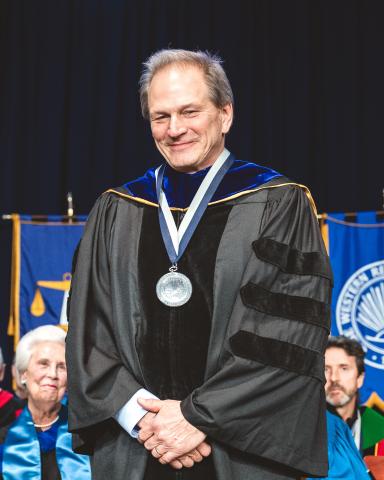Internationally recognized for his pioneering research on cystic fibrosis (CF)—a rare genetic disorder that primarily affects the lungs—Mitch Drumm has played a seminal role over the past nearly 40 years in discovering and defining key aspects of the origin and management of the disease.
Now, Drumm—the Connie and Jim Brown Professor in Cystic Fibrosis Research at Case Western Reserve University School of Medicine—has earned another title: Distinguished University Professor.
Early in his career, Drumm was co-discoverer of the gene that causes cystic fibrosis (CFTR) while working on his doctorate under Francis Collins, later the longest-serving director of the National Institutes of Health (NIH). The work is credited as a major motivator for the initiation of the Human Genome Project.
“In addition to his personal scientific contributions,” wrote Collins, in a letter nominating Drumm for the distinguished professorship, “Mitch is probably the most selfless genetics researcher that I know. His door is always open. He is always looking for ways to help others, and routinely passes up the chance to be in the spotlight himself.”
Drumm was also one of the earliest investigators to explore gene therapy for inherited human genetic disorders. His work on viral-based vectors, along with the efforts of many subsequent investigators, has since evolved into full-fledged efforts to treat CF and many other conditions with gene therapy.
Drumm’s research also contributed to development of the ultimately successful drug Trikafta, which has significantly extended the health span and lifespan of 90 percent of individuals with CF.
“[Drumm’s contributions] have revolutionized the treatment of CF,” wrote Gary Cutting, professor of genetic medicine, pediatrics and medicine at Johns Hopkins University, in his nomination letter. “[Drumm] was also one of the first investigators to recognize the importance of locating genetic modifiers of cystic fibrosis.”
For his career-long dedication combating the disease, Drumm was recognized with the highest scientific honor given by the Cystic Fibrosis Foundation—the Paul di Sant ‘Agnese Distinguished Scientific Achievement Award.
In 2015, recognizing the need for a hub of research activity dedicated to rare genetic diseases in children, Drumm initiated the formation of CWRU’s Research Institute for Children’s Health and serves as its director.
“The institute has served as a remarkable catalyst for creative research ideas—and also supports an extraordinary training environment for postdocs, graduate students, and others,” wrote Stan Gerson, dean of the School of Medicine.
Drumm has authored or co-authored over 140 manuscripts, presentations, reviews, and book chapters, delivered over 100 invited lectures, and earned six patents.
“Case Western Reserve has been an ideal environment to carry out my work, and I am appreciative of my colleagues—many of whom I’ve worked with for more than 30 years,” said Drumm, also a professor of pediatrics at the medical school. “Our research group has made a significant impact in CF research, and it is the family-like, group mentality that has made that possible.”


